| SHADOWS ON THE WALL | REVIEWS | NEWS | FESTIVAL | AWARDS | Q&A | ABOUT | TALKBACK | |||||
 Shadows off the beaten path Shadows off the beaten pathIndies, foreign, docs and shorts...
On this page:
CURED |
NO ORDINARY MAN |
P.S. BURN THIS LETTER PLEASE
| |||||
| See also: SHADOWS FILM FESTIVAL | Last update 26.Mar.21 | |||||
|
Cured Review by Rich Cline | 
| |||||
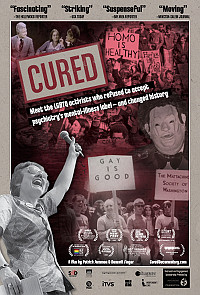 dir-scr-prd Patrick Sammon, Bennett Singer with Kay Lahusen, Frank Kameny, Charles Silverstein, Ron Gold, Magora Kennedy, Saul Levin, Richard Socarides, Don Kilhefner, Lawrence Hartmann, Gary Alinder, Richard Green, Sally Duplaix release US Sep.20 fff, UK Mar.21 flare 20/US 1h20  Now streaming... |
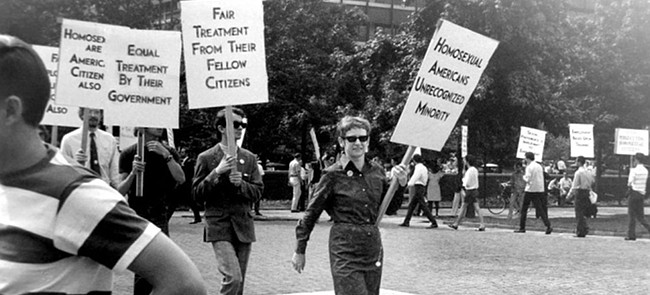 This rousing documentary confronts the "disgust, discomfort and fear" that was stoked in American culture in the mid-20th century, led by bigoted psychiatrists who wrongly labelled homosexuality as a mental disorder. With recently unearthed footage and vivid firsthand interviews, the filmmakers highlight people who forced the medical establishment to change a harshly discriminatory system. The film ends on a perhaps too-celebratory note, but is hugely informative and inspiring. The film opens with a clip of a school official in 1966 Miami spewing fear-mongering lies to students. At this time, most Americans believed that homosexuality was both learned behaviour and a mental illness, so discrimination was rife. Parents inflicted horrific pain on children through violently attacks, forced marriages and "cure" treatments that involved brutal torture like shock therapy, lobotomies or castration. Eventually, gays and lesbians had to fight back. As Gold said in a landmark speech to the American Psychiatric Association: "Psychiatry -- dedicated to making sick people well -- is the cornerstone of a system of oppression that makes gay people sick." Carefully documenting horrific "official" messaging and nightmarish treatment, parts of this film are painful to watch. The persecution of this entire segment of the population had been growing for decades, suppressing earlier scientists like Kinsey who discovered deeper truths about human sexuality. So groups like the Mattachine Society began taking on the APA, fuelling equal-rights marches in the late 1960s. They aggressively and comprehensively fought science with science, engaging psychiatrists in dialog until the truth became impossible to ignore any longer. Sharing their personal stories, gay and lesbian activists and psychiatrists recall fearing their parents and others, finding happiness only when they finally meet self-accepting homosexuals. They speak of various treatments they endured, struggling with the realisation that they couldn't actually be cured. And they knew that they could never get anywhere as long as they were simply dismissed as abnormal based on pseudo-science. The way they took on the system from within is breathtaking, assembled here like a riveting thriller. Once people were able to discuss the topic openly, the flawed research was quickly debunked: homosexuality is neither a sickness nor a chosen lifestyle. So it's fascinating to see how quickly attitudes changed, reflected in 1970s popular culture. Footage of discussions between experts is electric to watch. It's important to see this account of how the APA declared homosexuality normal in 1974, with "cures" proven to be harmful. But prejudice persists, and much of the world is still in the dark.
| ||||
|
No Ordinary Man Review by Rich Cline | 
| |||||
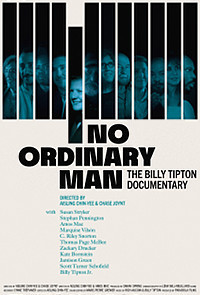 dir Aisling Chin-Yee, Chase Joynt prd Sarah Spring scr Amos Mac, Aisling Chin-Yee with Billy Tipton Jr, Susan Stryker, Stephan Pennington, Marquise Vilson, C Riley Snorton, Thomas Page McBee, Zackary Drucker, Amos Mac, Chase Joynt, Kate Bornstein, Jamison Green, Scott Turner Schofield release Can Sep.20 tiff, UK Mar.21 flare 20/Canada 1h24 TORONTO FILM FEST  Now streaming... |
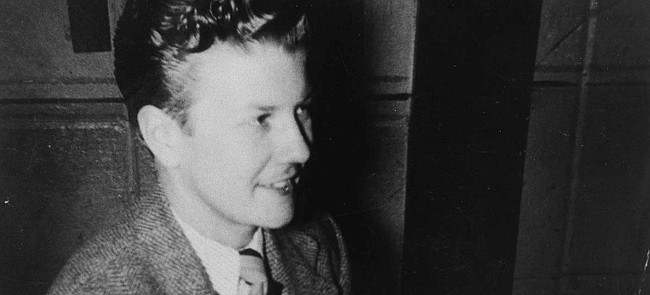 This documentary centres on groundbreaking American musician Billy Tipton, who has essentially been erased from history due to a lack of understanding about trans-masculinity. Strikingly well shot and edited, the film features artists and authors who discuss the bigger themes, which kind of sidelines Tipton's fascinating life. But his son offers telling firsthand memories, and the way the issue is explored has real power to change perceptions. Born in Oklahoma, Tipton was a jazz musician who travelled around the country, sidestepping offers of fame to instead start a family in Spokane with dancer Kitty Kelly, adopting three sons during their 20 years together. Notoriously, Tipton never revealed that he was trans, even to family and close friends who had no idea until after he died at 74 in 1989. There's of course much more to the story, and it shouldn't have taken this long for Tipton to be seen for who he was, the family be built and his contribution to culture. Powerfully, the music experts, performers and writers interviewed on-screen are trans, as are young actors who are seen auditioning to play Billy in a biopic, offering superbly dramatic readings of scenes from his life in front of a white screen. All make insightful observations, while audio recordings and video clips of Kitty are revelatory, as are new interviews with Billy Jr, who has always known that his father loved him, which is more important than anything else. Both of them forcefully note that Billy was a man, period. On-screen discussions meaningfully explore issues around living as a trans person, including the fear of what others might be thinking. That Tipton kept his secret for half a century is astonishing, leading official biographer Diane Middlebrook to get the story wrong simply because she recounted Tipton's life through a shocked outsider's eyes, filtering Tipton's truth through transphobia. In some ways, this documentary makes a similar mistake, seeing Tipton's gender without exploring his art. But as a look at bigger issues, it's seriously important. Each interviewee understands Tipton's reluctance to share his secret or visit a doctor, recognising the fear of allowing someone to have power over your body. And in the mid-20th century, the idea of trans-masculinity was unthinkable, preoccupied with genitalia as if that's all that defines gender. The salient point is that it wasn't his trans identity that made Tipton secretive; that's just how he was. He was also a great musician, husband and father. And he was astonishingly brave to hide in plain sight.
| ||||
|
P.S. Burn This Letter Please Review by Rich Cline | 
| |||||
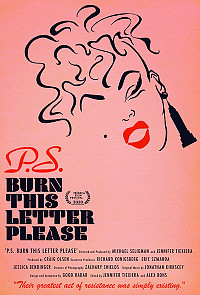 dir-scr Michael Seligman, Jennifer Tiexiera prd Michael Seligman, Jennifer Tiexiera, Craig Olsen with Michael Alogna, Claude Diaz, Joseph Touchette, Robert Bouvard, James Bidgood, George Roth, Henry Arango, Terry Noel, Lennie Dee, Michael Henry Adams, Robert Corber, Esther Newton release US Apr.20 tff, UK Mar.21 flare 20/US 1h46  Now streaming... |
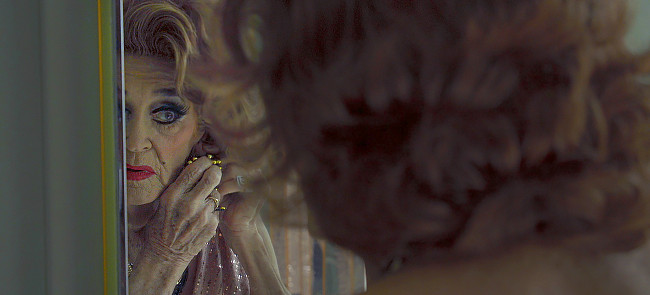 Beautifully compiled from original documents, archive film and new interviews, this film explores an under-documented segment of American history, namely the drag scene in 1950s New York, where young men found a sense of belonging. Even if it's a bit long, this is a wonderfully eye-opening trip into the past, revealing a lively subculture that's been underground for decades and today is a glorious part of the mainstream. Reconstructing gay history has been difficult because so many families have destroyed the correspondence and diaries of their gay relatives, often at their request. This film centres on the discovery of letters written to broadcaster Reno Martin after he moved to California. With this rare window into the 1950s New York gay scene, historians have taken a five-year journey to tell the stories of the men who wrote these letters. Photos and home movies they unearth are simply glorious, beautifully put together to depict the highs of performance and the deep lows of societal prejudice. The letter writers are witty, articulate men in their 80s and 90s who recall how they escaped their small hometowns and found friendships in New York's clandestine gay scene. Their colourful correspondence is animated on-screen alongside colourful footage, both old and new. And in present-day interviews, they speak emotionally about finding their families while performing in clubs and attending glamorous drag balls. Most still prefer terms like female impersonator or femme mimic rather than drag queen. "I didn't turn gay, I was born gay!" laughs James (87-year-old director of the queer masterpiece Pink Narcissus). Each of their anecdotes is hugely resonant and packed with hilarious detail, recalling a time when men couldn't be openly gay. Indeed, they were often arrested, and drag queens were far more at risk. These men found each other on this scene, knowing that they belonged together. And their stories reference police, the mafia and major celebrities in the largely straight audiences. The correspondence is written in snappy code that's widely recognisable today. Combined with the new interviews, what these men dish is both funny and moving, especially when they outline moments of both invigorating discovery and painful bigotry, including awful experiences in jail and mental institutions. As filmmakers Seligman and Tiexiera fill in a gap in recorded history, they also find powerful resonance in the memories of people who have found joy living in the most fabulous margins of society. And they had no idea that they were changing the world.
| ||||

See also: SHADOWS FILM FESTIVAL © 2021 by Rich Cline, Shadows
on the Wall
HOME | REVIEWS | NEWS | FESTIVAL | AWARDS
| Q&A | ABOUT | TALKBACK | | ||||

